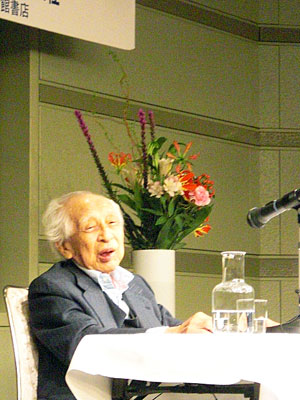Posted on : Jul.23,2015 17:45 KSTModified on : Jul.23,2015 17:45 KST
 |
Takeji Muno |
Takeji Muno witnessed Japan’s war crimes on-the-spot as a reporter, and is among the voices calling for peace from the Abe administration
On the afternoon of July 21, a 100-year-old journalist named Takeji Muno took the microphone during a press conference at the Foreign Press Center in Tokyo, Japan.
“For the past 80 years, I have walked down the road of journalism. What I feel most strongly now is that, whatever happens, we must not allow World War III to occur. The permanent members of the UN Security Council and a few other countries hold tens of thousands of nuclear bombs. What would happen if these were to be used?” Muno said.
Muno had been speaking quietly, but his voice began to grow louder. “Amid these present circumstances, Prime Minister Shinzo Abe is making a number of efforts to revert the Japanese social system into the militarism of the past.”
“He has appeared on television on a number of occasions to say that the government is responsible for protecting the lives and the property of the Japanese people and that he is the head of that government. He needs to think about what he ought to do to fulfill that responsibility.”
Muno began working as a reporter in 1936, at the age of 21. As the Asahi Shimbun’s correspondent for China and Southeast Asia, Muno spent four years reporting from the battlefield. What this sensitive man in his twenties witnessed on the scene of battle were numerous atrocities by Japanese soldiers. Convinced that Japan was responsible for the war, Muno returned to his hometown of Akita and was active for a long time in the local press and the anti-war movement.
During the press conference on Tuesday, previous Japanese prime ministers spoke out in an attempt to convince Abe to reconsider the security laws that the Liberal Democratic Party rammed through Japan‘s House of Representatives on July 16.
Last of all, Muno asked some hard questions about the historical responsibility of the Japanese media.
Four days before Japan surrendered on Aug. 15, 1945, Japanese newspapers had received intelligence that the government had accepted the Allies’ Potsdam Declaration, but they did not report the military‘s surrender until the Japanese Emperor announced this himself. Even after the end of the war, the Japanese media were silent about the country’s responsibility for the war and the need to apologize, Muno said.
“Journalism is the diary of history. It reveals the causes of social phenomena to enable us to create a future in which we do not make mistakes. Will a day come when we can say that the Japanese media adequately fulfilled that role?”
Opposition to Abe’s security bill is spreading throughout all sectors of the Japanese public. The day before, around 150 scholars - including Toshihide Maskawa, Nobel Prize laureate in physics and professor emeritus at Kyoto University - held a demonstration calling for the security bill to be scrapped.
By Gil Yun-hyung, Tokyo correspondent
english.hani.co.kr/arti/english_edition/e_international/701512.html

